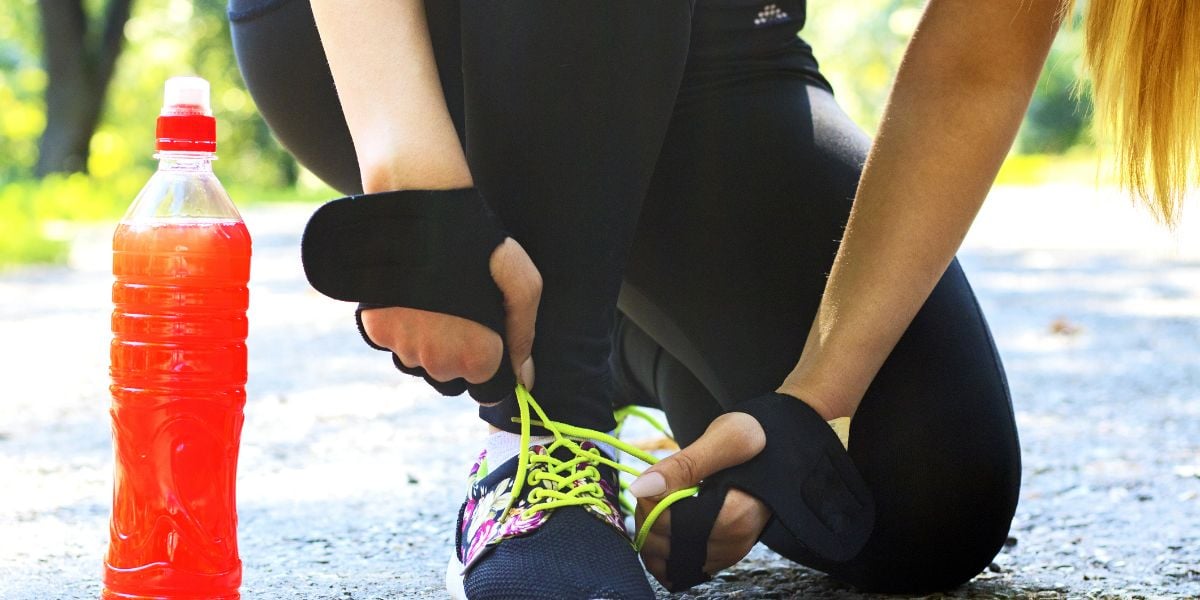Sports drinks are beverages that are specially formulated to help people rehydrate during or after exercise. They are usually rich in carbohydrates – the most efficient source of energy.
As well as carbs, which are important in maintaining exercise and sport performance, sports drinks usually contain sweeteners and preservatives.
Sports drinks also contain electrolytes (minerals such as chloride, calcium, magnesium, sodium and potassium), which, along with body fluid, diminish as you exercise and sweat.
Replacing the electrolytes lost during training promotes proper rehydration, which is important in delaying the onset of fatigue during exercise.
Keeping rehyrdated is particularly important for people with diabetes who have an increased risk of dehydration due to high levels of blood glucose
Types of sport drinks
There are three main types of sports drinks available, all of which contain various levels of fluid, electrolytes and carbohydrate
Isotonic
Isotonic drinks contains similar concentrations of salt and sugar as in the human body
- Quickly replaces fluids lost through sweating and supplies a boost of carbohydrate.
- The preferred choice for most athletes, including middle and long-distance running or those involved in team sports.
Hypertonic
Hypertonic drinks contain a higher concentration of salt and sugar than the human body.
- Normally consumed post-workout to supplement daily carbohydrate intake and top-up muscle glycogen stores.
- Can be taken during ultra distance events to meet the high energy demands, but must be used in conjunction with Isotonic drinks to replace lost fluids.
Hypotonic
Hypotonic drinks contain a lower concentration of salt and sugar than the human body.
- Quickly replaces fluids lost by sweating.
- Suitable for athletes who require fluid without a carbohydrate boost, e.g. gymnasts.
Most sports drinks are moderately isotonic, containing between 4 and 5 heaped teaspoons of sugar per five ounce (13 and 19 grams per 250ml) serving.
Risk of water intoxication
While water is the best option for rehydrating your body, drinking excessive amounts can cause an imbalance of electrolytes in the body. This condition is known as water intoxication and although it is very rare, it can be fatal.
It occurs when large quantities of plain water are consumed to replace the fluid and electrolytes lost through heavy sweating caused by either hot weather or exercise, or a combination of the two.
The resulting low concentration of electrolytes can cause over hydration, which disrupts nerve cell function. Severe over hydration can lead to disoriented behaviour, convulsions, coma, and even death.
To reduce the risk of water intoxication, most sports drinks comprise of ingredients that replenish fluids and electrolytes in a similar ratio to that usually found in the human body. However, some products contain low concentrations of electrolytes, so excess consumption of them could still cause an imbalance of these minerals.
Controversy surrounding sports drinks
In July 2012, research published by the Guardian questioned the alleged benefits of sports drinks, such as enhanced performance and recovery , with experts from the University of Oxford claiming there is not enough evidence to support the claims from manufacturers and advertisers.
The research, which was published in the peer-reviewed medical journal BMJ Ope, involved a systematic assessment of magazine and website-based claims for improved sports performance and recovery made by advertisers for sports-related products, including drinks and supplements
The researchers said they found a significant lack of evidence to support the beneficial effect claims made by the vast majority of products.
Of the websites and magazines that did provide evidence to back their claims, half of the evidence was deemed to be unreliable.
Based on their findings, they concluded that it is practically impossible for people to make informed choices about the pros and cons of advertised sports drinks and other sports-related products.




